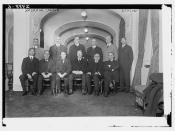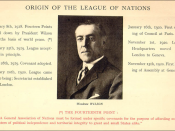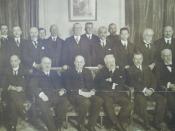The League of Nations was set up by Woodrow Wilson and his 14 points, countries around the world decided to join while others didn't for there reasons. Other countries did join but were doing things for example, Italy invading Abyssinia and the L of N knew about it, but failed to do anything about it. In my essay, there are a number of questions asked and I will be answering them with detail, explaining them and giving my own views on them. The questions include the main aims of the league, countries not being in the league and how it weakened it and explaining how successful the league was in 1920's and 30's.
In January 1918 Woodrow Wilson set up 14 points which included a very important one, number 14 was 'An international organisation to be set up to protect the independence of countries and settle disputes' which was to be called 'The League of Nations' and the 14 points, Woodrow believed, that nations around the world should co-operate to achieve world peace.
The main aims of the league was to keep world peace by dealing with disputes between the nations around the world, for example if there was a problem with trading or foreigners living there, the league would help sort it out with the nations not involved and decide what to do on a anonymous vote. To safeguard the independence of countries and there new frontiers, to encourage nations to reduce their armaments and to improve all the living and working conditions for all the people in there nations which the league would thought will make all the nations to become better friends, and not worse enemies.
When the league was set up by the American's, lots of nations wanted to join, but when America got a new president, they refused to join, and they were the most powerful country and as being the most powerful nation, they had the largest army and navy etc which would have helped the league because the league had no army of itself encase they had to use force, they would have to use army's from other nations. Other nations did join, but that was only for a short time and at anyone time, the more important countries were not members, they all started and left at different times which didn't help the league because they couldn't get all the more powerful countries to be members at the same time so they wouldn't have more power and authority to support them and as USA didn't join at all, there power would have helped the sanctions work when the league enforced them. The league council was dominated by mostly powerful European countries and appeared to others as to a 'European club' which weakened the league in a way that it didn't have other nations from around the world, and not many nations coming together. The League of Nations couldn't really make decisions on there own, as America had made the League out of Woodrow's 14 points, and as they weren't being involved in the league, they wouldn't help make the decisions. Germany did join the league but only for a short period of time, and luckily they did join because they were the main source of the problem and as they joined the league, the league was able to keep a careful watch on them and know what they were up to. As not many nations joined in the beginning, the nations that didn't joined might have been waiting for other nations to join and they would be able to see how the league worked and what they did. If the nations that didn't join in the beginning, they would be able to see if it was a good idea or not to join the league because they had been waiting behind the other nations to check the league out.
The main aim of the League of Nations was to stop wars. In the 1920s, there were many small disputes between countries, which the League tried to solve. There were so many things that they stopped, all the way through the early 1920's. In 1923, there was an incident between Greece and Bulgaria, and some Greek soldiers were killed in a small fight on the border between Greece and Bulgaria. The Greeks were angry and they invaded Bulgaria and they asked the League to help them. Again the council of the League met and condemned the Greeks, and told them to leave Bulgaria and the Bulgarian government sent orders to its army not to fight back. The Greeks did as the League said and they left Bulgaria. Apart from the main invasions, the league also did other jobs, including closing down for Swiss factories selling drugs, attacking the slave traders in Africa and freeing 200,000 slaves, the league also helped prevent the spread of malaria and leprosy, they also took home half a million prisoners of WW1 and they also sent economic experts to Austria and Hungary. As the league were doing so well to start with. In Corfu, there was an Italian general who was killed while he was doing some work for the League in Greece. The Italian leader Mussolini was angry with the Greeks. He invaded the Greek island of Corfu. The Greeks turned to the league and asked the League to help them. The Council of the League met. It condemned Mussolini, and told him to leave Corfu and they told the Greeks to give some money to the League. Mussolini refused to accept its decision and he refused to leave Corfu. The League changed its decision and told Greece to apologise to Mussolini and to pay the money to Italy and the Greeks did as the League said and then Mussolini gave Corfu back to Greece. This was a warning, and the start of league falling apart, because they were starting to loose power because other nations had people coming into stronger power and places like Italy were starting to ignore the league.
The 1920s had been times of prosperity and democracy. But, after 1930, there was a great depression. Countries now wanted to increase their wealth at other nations' expense. Fascist governments which believed in the survival of the strongest came to power in Germany and Italy. In the 1920s, the League had been quite successful. In the 1930s, it failed terribly. In the 1930s there was a world-wide economic depression. Japan tried to overcome the depression by building up an empire. In 1932, the Japanese army invaded Manchuria and threw out the Chinese. They set up their own government there and called it Manchukuo. China asked the League to help and the League sent a group of officials led by Lord Lytton to study the problem which took a year and finally in February 1933 it ordered Japan to leave Manchuria but, Japan refused to leave Manchuria and instead, Japan left the League. Many countries had important trading links with Japan. The League could not agree on sanctions or even a ban on weapons sales. Britain and France did not want a war, so nothing was done. The Japanese stayed in Manchuria and the League had failed its job because the league was not able to enforce any proper sanctions or fines because countries were just avoiding them. The invasion of Manchuria had two important side effects - putting aside for a moment its dreadful revelation that the League was powerless in the face a determined aggressor. First, it raised the prestige of the Japanese Army. Second, it made it possible for the Army to pressurise the Japanese government to undertake a policy of armed expansion.
There was also another incident with Italy and Abyssinia, because Mussolini, from Italy got ready to invade Abyssinia (Ethiopia) because he wanted war and glory and when Abyssinia asked the League to help, the League talked to Mussolini - but he used the time to send an army to Africa and the League suggested a plan to give part of Abyssinia to Italy. Mussolini ignored the League, and invaded Abyssinia. The League banned weapons sales, and put sanctions on rubber and metal. The Abyssinian Emperor Haile Selassie went to the League to appeal for help, but it did nothing else - in fact Britain and France secretly agreed to give Abyssinia to Italy (the Hoare-Laval Pact) and Italy conquered Abyssinia and the League had failed again because they didn't have enough power or authority, because everyone was just slipping through there grasp to give countries sanctions etc.
All this had happened between 1930 and 1934. The main culprits were Italy and Japan, they were able to invade countries and they didn't have the proper telling off from the league and the right sanctions given to them, they were able to skip them and give the fines to the other countries and both Italy and Japan was able to keep the places it invaded because Britain and France didn't want to stop any of them because they didn't want to get involved. By 1935, most countries did not think that the League could keep the peace between the countries. When Hitler began to break the Treaty of Versailles in the 1930s, the League was powerless to stop him. The League failed for the last time, and the only way to stop Hitler was a Second World War.




